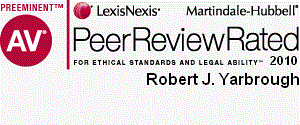Newsletter Issue 2 - April 2009
In this issue:
iPod to the Queen
Applications and revenue down at the PTO
Trademarks- Use them or lose them
Protecting yourself from infringement on EBay
iPod to the Queen.
by Adam Garson
You may have heard that during his recent visit, President Obama reportedly presented Queen Elizabeth II of England with a personalized iPod loaded with 40 show tunes. An article in the Electronic Frontier Foundation ("EFF") web site by Fred von Lohmann recently pondered whether President Obama violated the law by presenting the Queen with digital media?
Under traditional copyright law, the "first sale" doctrine permits one to transfer, resell, or gift copyrighted materials to another person despite the copyright owner's exclusive right of distribution so long as the owner or transferor does not copy the material. For example, if I own a painting by a famous artist, I am free to sell it to another party even though I don't own the copyright. I can't, however, commission a copy of the painting and sell the copy. That would constitute copyright infringement.
That's fine and dandy except, as the EFF was quick to note, in the digital era it's rare that the possessor of digital works, such as music, actually "owns" it. Instead, when one purchases music via a computer it is done under a "license," which in most instances does not transfer ownership to the purchaser.
Whether President Obama broke the law in giving a the Queen an iPod is, as the EFF noted, difficult to determine and is dependent upon Apple's 9,000 word license, which appears to purposely to leave the question of ownership unanswered. Additionally, it's unclear how the music on the Queen's new iPod was transferred to the player. If it was directly transferred to the iPod, the President or his staff may not be in breach of the iTunes license but if the music was copied from another collection then there may, in fact, be an infringement issue. There certainly would be an issue if the original copy of the music was not deleted after making a copy for the Queen.
The iTunes terms of use also states that the music purchased from its store is for "personal use". The EFF raises the question of whether a diplomatic gift qualifies as "personal use" or, is it, perhaps, "fair use." If it is not fair use, can President Obama be sued for breach of contract?
Of course, while the questions posed above are hypothetical -- both the President and the Queen are protected by sovereign immunity --- a simple gift of music raises some very pertinent questions about the nature of transactions in the digital era. To read the complete article, visit the Electronic Freedom Foundation web site.
Patent filings and revenue down at the PTO
by Robert J. Yarbrough
Based on patent filings thus far in 2009, the number of new applications filed in 2009 is projected to drop by more than 11 percent from 2008. The drop in applications translates into a significant decrease in current revenue to the Patent and Trademark Office ('PTO') from fees. The drop in revenue creates a major budgetary problem for the PTO, which still is facing a record backlog of patent applications awaiting review. The PTO reportedly has stopped hiring new patent examiners due to budget constraints. Because of the usual attrition in the examining corps, we expect that the time from the filing of the patent application to the first office action by the PTO will increase from the current average of 26 months. We therefore reach the following incongruous result: fewer patent applications = longer review times.
Trademarks - Use them or lose them
by Adam Garson
The United States trademark system is a "use" based system. Using your trademark bestows upon you the benefits of trademark ownership so long as you are the first to identify your particular goods and services in the geographical region in which you do business. Use is paramount and can even trump another user's valid federal registration if your use is first in time.
Importantly, a live mark -- one that is in use --- must be associated with particular goods and services to remain viable. Once the association dies so does the mark. This vital relationship is underscored by various cases involving lawyers who filed trademark registration for uses, which the Patent and Trademark Office (PTO) considered fraudulent. One case in particular, Medinol v. Neuro Vasx, Inc., 67 U.S.P.Q. 2d 1205 (TTAB 2003) is worth summarizing:
Neuro Vasx Inc. ("Neuro Vasx") filed a trademark application for NEUROVASX identifying "medical devices, namely, neurological stents and catheters," based upon an intention to use the mark in commerce. When Neuro Vasx filed a Statement of Use for each of the goods in the application, the President of the company and its attorney declared that the information was truthful.
At some point after the PTO granted registration of NEUROVASX, Medinol Ltd. ("Medinol") filed a petition to cancel the Neuro Vasx registration, alleging that at the time Neuro Vasx filed its Statement of Use, it had not used the mark on or in connection with stents, and had not, as of the date of the petition to cancel, commenced such use and were thus fraudulent.
In response, Neuro Vasx sought to amend its flawed registration by deleting "stents" from the list of goods. Medinol responded by asserting that the alleged fraud tainted the entire registration. The TTAB sided with Medinol and invalidated the mark in toto. Later decisions have supported the Board's Medinol decision. See, e.g. Nougat London Ltd. v Carole Garber, TTAB 2003; Tequila Cazadores S.A. v. Tequila Centinela, S.A., TTAB 2004; Grand Canyon West Ranch, LLC v. Hualapai Tribe, 88 USPQ2d 1501 (TTAB 2008).
Although the Medinol decision has obvious lessons for lawyers filing trademark applications, it also imposes a duty on trademark owners to insure that their marks continue to identify the goods and services upon which their registrations are based. If you do not amend your trademark registrations to conform with current use of the mark, a third-party could potentially initiate a cancellation proceeding alleging fraud on the Trademark Office. In a worst case scenario, you risking losing the entire registration even if some of the registered uses are valid. If you believe you have a problem, promptly consult a trademark lawyer.
Protecting yourself from trademark, copyright or patent infringement on EBay
by Robert J. Yarbrough
Are pirates selling counterfeit goods bearing your trademark on EBay? Are unlicensed copies of your software or bootleg copies of your CD being sold on EBay? Has ad copy been lifted from your web site and placed in EBay ads? Are knock-offs of your patented invention being sold on EBay? If you answer 'yes' to any of these questions, your property rights are being infringed. So what can you do about it?
EBay's "VeRO" program allows the owner of the property right or the owner's agent to designate infringing listings for removal from EBay. The process is simplicity itself. First, download the "Notice of Claimed Infringement" form. The form asks that you identify the property right that is being infringed, identify one or more infringing listings, and sign the form. You then fax the completed form to EBay, where staff will review the completed form and the property rights that you claim. EBay staff then will remove the offending EBay listing. You can submit subsequent "Notice of Claimed Infringement" forms electronically.
It is your obligation to identify the offending listings, but EBay makes that easy, too. You can create automated searches within EBay relating to your product and configure the system to automatically e-mail the results of the search to you. Is monitoring too much trouble for you? There are fee-based providers that will be happy to perform the monitoring and submit the forms for you.
The VeRo program is an outgrowth of efforts by owners of intellectual property rights to hold EBay liable for infringement by persons selling on the site. See, for example, the case of Tiffany v EBay, Inc., No. 04 4607 (S.D.N.Y. July 14, 2008), where EBay was held not liable for contributory infringement of Tiffany's trademark due to the sale of counterfeit goods in part because EBay had the VeRO program in place to remove infringing listings. The court held that Tiffany had the duty to police the listings, not EBay. The case is currently on appeal.
The EBay VeRO program does not always function as advertised. In Hansson, Inc. v Brower, 4:07-cv-05898-CW (N.D. Cal. Complaint filed November 21, 2007), Hansson named EBay as a defendant in a trademark infringement case where Hansson submitted eight different notices plus a cease-and-desist letter to EBay, all with no action from EBay to take down any of the listings. The lesson: police EBay while EBay polices the infringers. To learn more about the VeRO program, visit EBay's description of the program.

